Menu
Table of contents
Still, opinions are divided on whether or not you should advertise on your brand name, especially if you are already in position 1 organically and your Google My Company profile is also highly visible.
To give you some clarity on when advertising by brand name is and is not interesting, I'll show you some concrete examples.
But before I do, I'll first explain why you may or may not want to advertise by brand name in the first place and what the different types of brand names are.
Why do you want to advertise on your brand name?
When (potential) customers are looking for your company, products and/or services, you want to be easily found in Google. By advertising on your business name, you ensure that you are always at the top of the search results.
Above your competitors who are also bidding on your company name, as well as above other companies with a similar company name.
Why not advertise on your brand name?
If you are already in position 1 organically, you may choose not to advertise on your brand name. The hypothesis is that you do attract that traffic because you're in position 1 organically and people scroll past the ads for the best search result. Yet this is not always the case.
And now that we've had that, let's move on to the scenarios :).
The different types of brand names
There are different types of brand names. For example, your brand may include the niche or market in which you operate. You may also see a product name reflected in the company name. Sometimes a brand name has a different meaning and sometimes it is completely unique.
Below I explain with some examples why it is important to advertise on some of those different brand names. This way you make sure you are always visible to users who are looking for your business.
Example 1: Niche, product or market in company name
Do you have a descriptive brand name with your niche, product or market in it? For example, one like Online Marketing Agency or Ledstrip-specialist.co.uk?
Then it is often important to advertise on your brand name. See below the example of Ledstrip-specialist.co.uk. It is immediately clear that this party sells LED strips.
Only they are not the only one advertising on this brand name. In fact, the second ad is from Leddirect.co.uk, a competitor that also advertises on "Ledstrip Specialist." Ledstrip-specialist.co.uk may have the highest organic position in this case, but if they did not advertise on their own brand name, Leddirect.co.uk would be at the top.
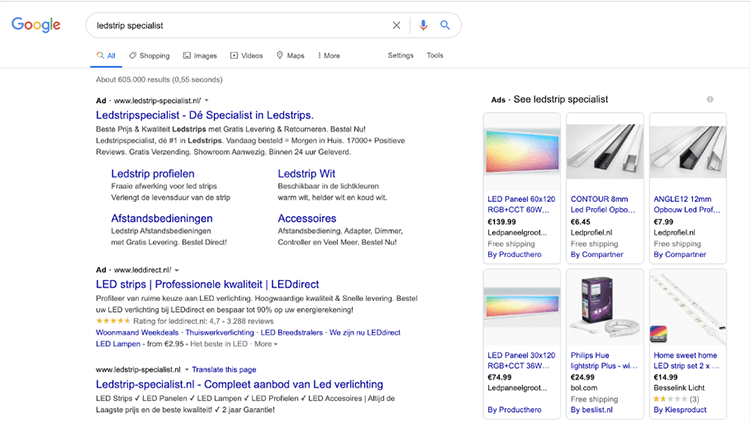
Example 2: Brand name has different meaning
Sometimes a brand name also has another meaning. Take Magpie, for example: a premium Smartwallet brand, but also the name of a well-known species of bird.
The top 2 organic positions are occupied by birdprotection.co.uk and Wikipedia. These are domains with high authority scores, making them difficult to beat.
So in this case, Ekster must advertise on their brand name, otherwise they cannot be found by (potential) customers.
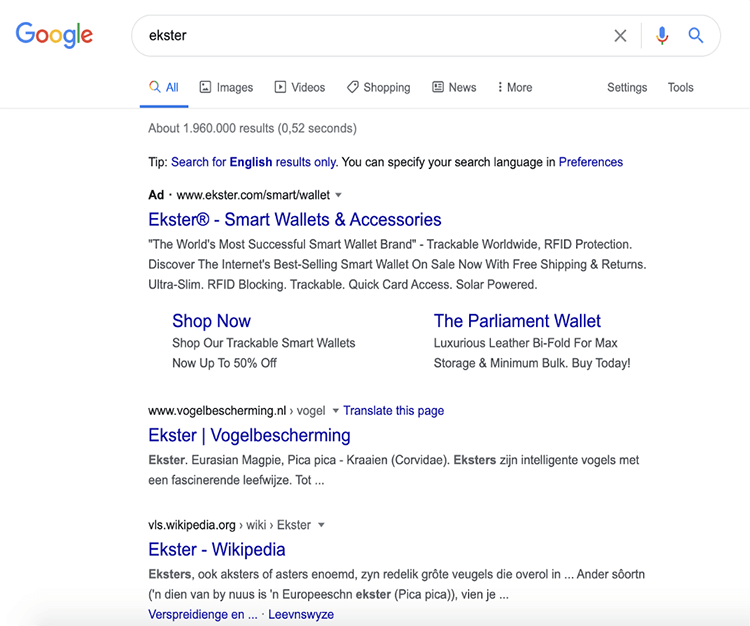
Example 3: Company name consists of a unique word
These days, you see more and more companies with unique names. Take Klaviyo, for example, a Marketing Automation tool with a name that doesn't come up very often.
In the screenshot below, you can see that they occupy the highest organic position, but there are also competitors who advertise on their brand name. Because of this, they have to advertise on their own brand name as well. If they don't do this, a lot of traffic is lost to competitors.
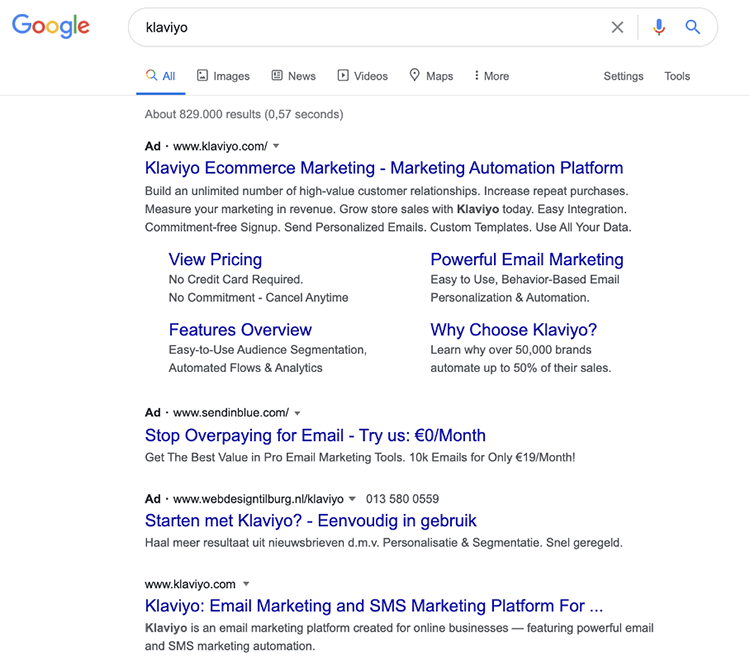
The great advantage of advertising on your own brand name
To save costs, some advertisers choose not to advertise on their own brand name. They then assume they will attract visitors because they are at the top of Google.
You have seen above that this is by no means always the case, as others may also advertise on your brand name. You must ask yourself whether the costs saved outweigh any lost sales.
The big advantage of advertising on your own brand name is that the cost per click(CPC) is generally very low. This is due in part to a high quality score and because Google wants to reward you as the brand owner.
This is because you are the most relevant option for users, and that is rewarded. In other words, the cost of advertising on your own brand name is relatively low.
Don't want to advertise on your brand name? Then pay close attention to auction insights!
Do you have a top organic position and no competition advertising on your brand name? If so, you might choose not to advertise on your brand name. If you do this, check once in a while to make sure a competitor doesn't suddenly start advertising on your brand name.
This is perfectly legal and so there is nothing you can do about it. In the auction insights in Google Ads, you can see if competitors are advertising on your brand name by navigating the menu to "Keywords" > "Auction Insights.
You can then see here which competitors competed in the same auctions as you and how often they ranked above or below your ad.
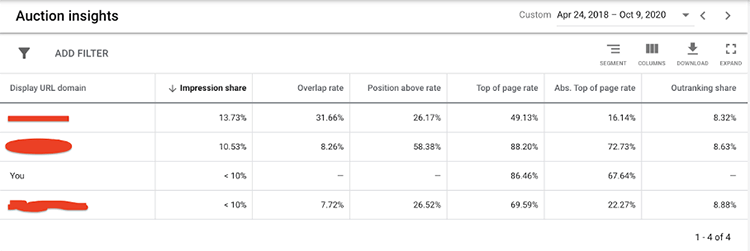
Advertising by brand name: do it!
Ultimately, the decision whether or not to advertise on your brand name will be made based on factors that are different for each company.
However, my advice is to advertise on your brand name in most cases, even with a high organic position. The examples I have given in this article show that a place at the top of Google does not always equal maximum visibility in the search engine.
When competitors advertise on your brand name, you are pushed to the bottom of the search results page and that ultimately leads to less traffic, leads, customers and sales. To avoid this, it's best to always advertise on your brand name: that way you remain visible to (potential) customers who want to buy from you specifically.




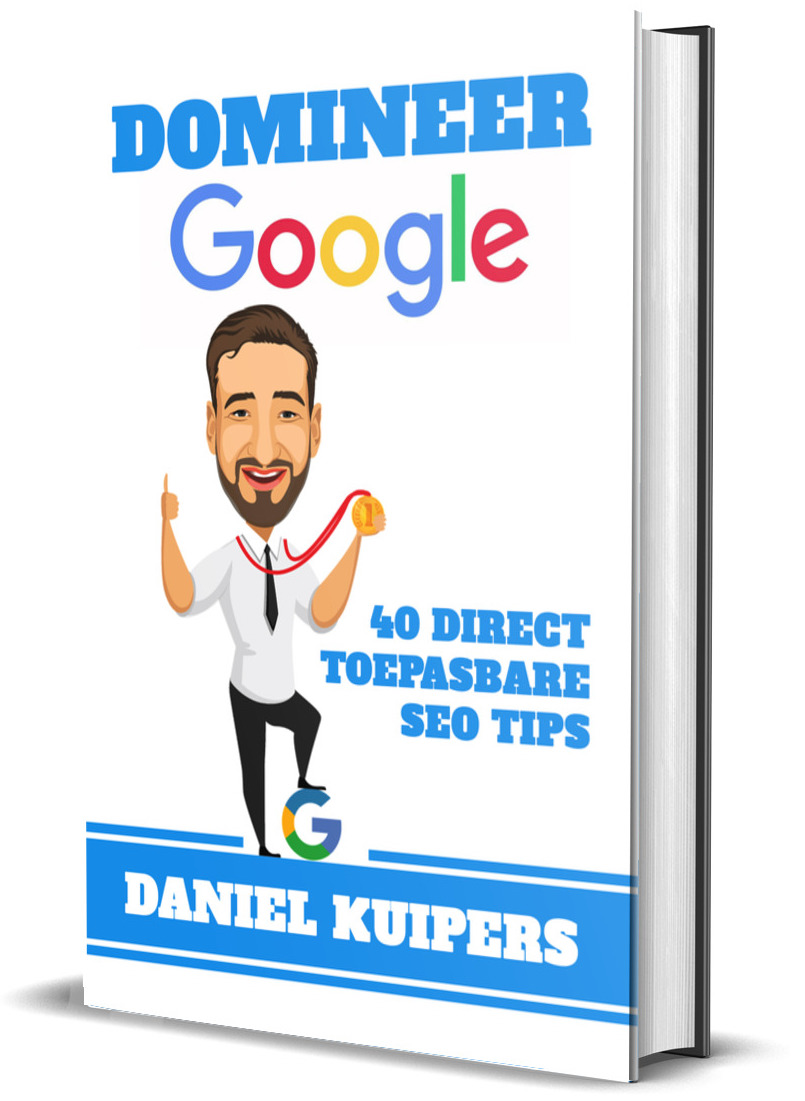






Written by: Daniel Kuipers
Daniel is the founder of Online Marketing Agency. He constantly scours the Internet for the latest gadgets and tactics and blogs about them in understandable language. Well, sometimes.